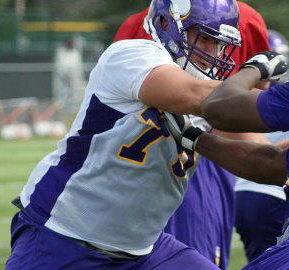Most Vikings fans may not know who Levi Horn is, but the offensive tackle is looking to make the team because he has a lot of people looking at him back home in Montana. It’s one thing to be a home-grown hero, but Horn has the eyes of an entire race on him.

Horn is a Native American and a member of the Northern Cheyenne-Montana tribe. Like a lot of young football players, he dreamed of making it to the NFL and having a professional football career. However, when he was looking for someone of his own race to emulate, it was difficult. In terms of representing his race, Horn has become an icon in the Native American community and an NFL trailblazer.
“There aren’t many Native Americans in the NFL,” Horn said. “It’s a source of pride – both for me and the native country. I go around to reservations and talk to kids. I had somewhat of a troubled background when I was a kid so I can relate to those kids that aren’t on the right path and show them someone can succeed. I’m kind of a worker bee around here, but it counts. “It was important to me to make it to the NFL because I love the game,” Horn said. “I want to be a role model, because when I was kid, I wanted to be in the NFL and noticed that there weren’t any Native Americans in the league and wanted to change that.”
His chances of getting to the NFL didn’t look great early on. He was recruited to play at the University of Oregon, where he redshirted his freshman year as the team tried to convert him to tight end. However, it became clear to him that he wasn’t going to get much in the way of playing opportunities, which led to frustration. Following his freshman season, Horn was one of four Oregon players to transfer out of the school to go to different programs in hopes of getting the playing time he needed to get noticed and succeed.
The University of Montana became his landing spot and going there significantly changed his life both on and off the field. Not only did he become an All-America offensive tackle, he got in touch with his roots and the tribal traditions of the Northern Cheyenne community. He credits that moves as one of the great blessings of his life.
“It was a great fit for me,” Horn said. “From the football side of things, I went there because they have a great tradition. It was close to my home (in Spokane, Wash.) and there is a very large Native American population there. It was great to be there and I was able to be someone that Native kids could look up to on the local college team. That was what really got me started in wanting to work with kids and let them know there are opportunities out there if they’re willing to work hard to reach their goals – whether it’s football or going to college or preparing for life as adults.”
Horn was shocked to see the depth of despair that exists on Native American reservations. The practice of taking land that was home to Native Americans dates back to the 1850s, when conflicts in what would become Oklahoma raged between settlers heading west and the Native Americans who lived on the land. As a compromise solution, Native Americans were forced onto reservations, where many generations have remained for the last 150 years. The problems of crime, alcoholism and poverty have long been issues in the Native American community and it has become systemic.
Horn hopes that his celebrity status can help bring about change among Native Americans and his efforts are part of a new generation hoping to break the stereotypes and ongoing problems that affect his people.
“There are a lot of problems on reservations and there is somewhat of a sense of hopelessness,” Horn said. “Right now, people like me and the younger generation are trying to uplift that. I’m in contact with a lot of people who do a lot of good things on reservations and we’re all just trying to change things for the better. Being a football player gets their attention and shows them that there are opportunities out there. I see a lot of good things happening and hopefully it will remain on the upswing.”
In the process, Horn has become a person that the next generation of Native Americans can look up to and hope to emulate. He wouldn’t have thought that was possible when he was growing up, but he hopes to part of the process of bringing about positive change.
“When I was a kid, I never would have thought that I could be a role model, but Native kids need someone they can look up to because, for the most part, we aren’t represented that much in things like sports or entertainment,” Horn said. “I’m hoping to change that and being someone positive that kids can look up to. If we are going to make a change take place, we need more Native Americans to step up and be part of making a change for the better. If I can help move some kids in the right direction, I’ve done my job and have helped my people and my community.”
Reprinted with the permission of the Vikingupdate.com, written by John Holler who has been writing about the Vikings for more than a decade.